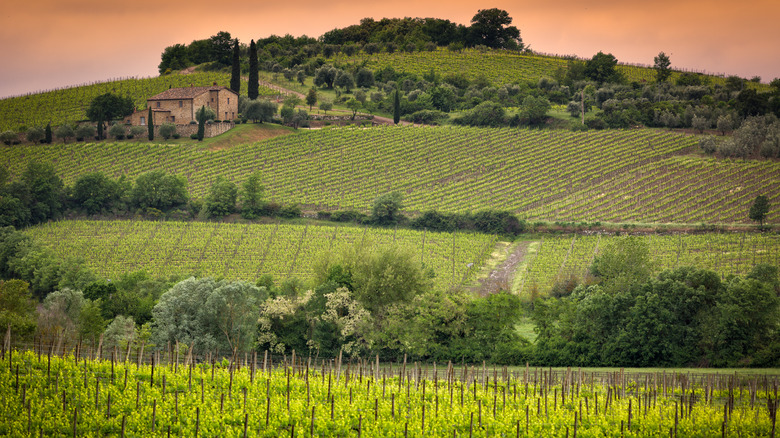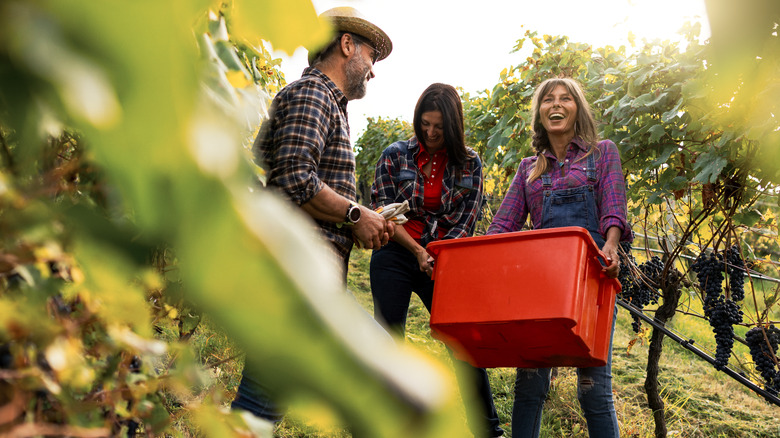The Underrated Type Of Lodging In Italy That's Cheaper And More Scenic Than Hotels
When planning a trip to Italy, most travelers envision staying at charming hotels in historic city centers or luxurious villas overlooking the Tuscan countryside. However, as scenic as these accommodations are, they are also very, very expensive, starting at $200 to $300 per night or even more. What if we told you that there's a type of lodging that offers an authentic Italian experience, often at a fraction of the cost, while immersing you in the country's most picturesque landscapes? Enter agriturismo — a hidden gem of Italian accommodations that combines the rustic charm of rural life with the comfort and amenities of a traditional hotel.
Agriturismo, a blend of the Italian words" agriculture" (agriculture) and "turismo" (tourism), refers to farm stays or country accommodations that are typically family-run. These establishments are working farms where the owners make olive oil, wine, cheese, or other local products. Hosting is a kind of "accompaniment" to the primary job. Agriturismi (the plural form of agriturismo) usually have onsite restaurants where meals are prepared using at least 80% ingredients from their farm. Guests are invited to stay on the property, often in restored farmhouses or guesthouse complexes, where they can enjoy the tranquility of rural Italy while gaining insight into the respective region's agricultural traditions.
Despite the unique experience and postcard-worthy locations, agriturismi are often more affordable than hotels, particularly those in popular tourist areas. The cost of a stay at an agriturismo can vary depending on the region and amenities offered, but in many cases, you'll find that prices are lower or on par of those at nearby hotels. This is especially true if you're traveling during the off-season or booking directly with the farm. According to Agriturismo Italia, there are over 20,000 agriturismi across Italy!
Agriturismo: a unique and authentic experience
One of the biggest draws of agriturismo is the authenticity it offers. Unlike conventional hotels or chain hotels that cater to tourists, agriturismi provide a genuine glimpse into Italian country life. Imagine waking up to the sound of roosters crowing, strolling through olive groves, petting farm animals, and ending your day with a farm-to-table meal. This is the quintessential agriturismo experience — a slower, more deliberate way of traveling that allows you to connect with the land and its people.
Many agriturismi also offer activities that allow guests to try new skills and immerse themselves in the local culture. Depending on the region and the type of agriturismo you're staying at, you might find yourself participating in a grape harvest, learning how to make "fatto in casa" (homemade) pasta from scratch, or exploring the surrounding countryside on a guided hike. For travelers looking to engage with Italy beyond the typical tourist attractions, agriturismo provides an unmatched opportunity.
Agriturismi are often located in some of the most scenic areas of Italy, far from the overcrowded tourist hubs. This, however, makes it necessary to get a rental car so you can get to your often remote accommodations, as public transit in rural Italy is sparse. (Some hosts offer to pick up guests from a nearby train station, but this needs to be agreed upon in advance.) In Tuscany, for example, staying at an agriturismo might mean waking up to golden fields dotted with cypress trees, while in the Dolomites, you could find yourself surrounded by towering peaks and alpine meadows.
Sustainability, finding the right agriturismo, and other tips
Another advantage of choosing agriturismo is the positive impact it has on the environment and local communities. By staying at a farm, you're supporting a small, family-owned business and contributing to the preservation of traditional farming practices — night and day compared to a large hotel. Agriturismi often prioritize sustainability, using organic farming methods, sourcing their food locally, "zero-kilometer" style, and implementing eco-friendly practices to reduce their environmental footprint. It doesn't get better or greener than this.
Finding an agriturismo that suits your needs is easier than ever, thanks to numerous online platforms dedicated to farm stays in Italy. Websites like Agriturismo.it, Booking.com, and Airbnb offer a range of options, from no-frills farm stays to luxury estates with every amenity you could wish for. When booking, consider what kind of experience you're after. Do you want to stay on a working farm where you can participate in daily activities, or would you prefer a private retreat where you can relax and enjoy the scenery? Are you interested in trying local foods, or do you prefer to cook your own meals?
For an even more hands-on experience, look into WWOOF (Worldwide Opportunities on Organic Farms). Founded in 1971, this cultural and educational exchange program connects volunteers with organic farms, where they share daily life and work (around 25 hours per week) in exchange for food, accommodation, and hands-on experience in sustainable farming practices. A WWOOF stay usually lasts one to two weeks, and you get to pick your host. So, if you don't mind getting dirty and want to really learn about farming (while staying in Italy for free!), this is the way to do it.


